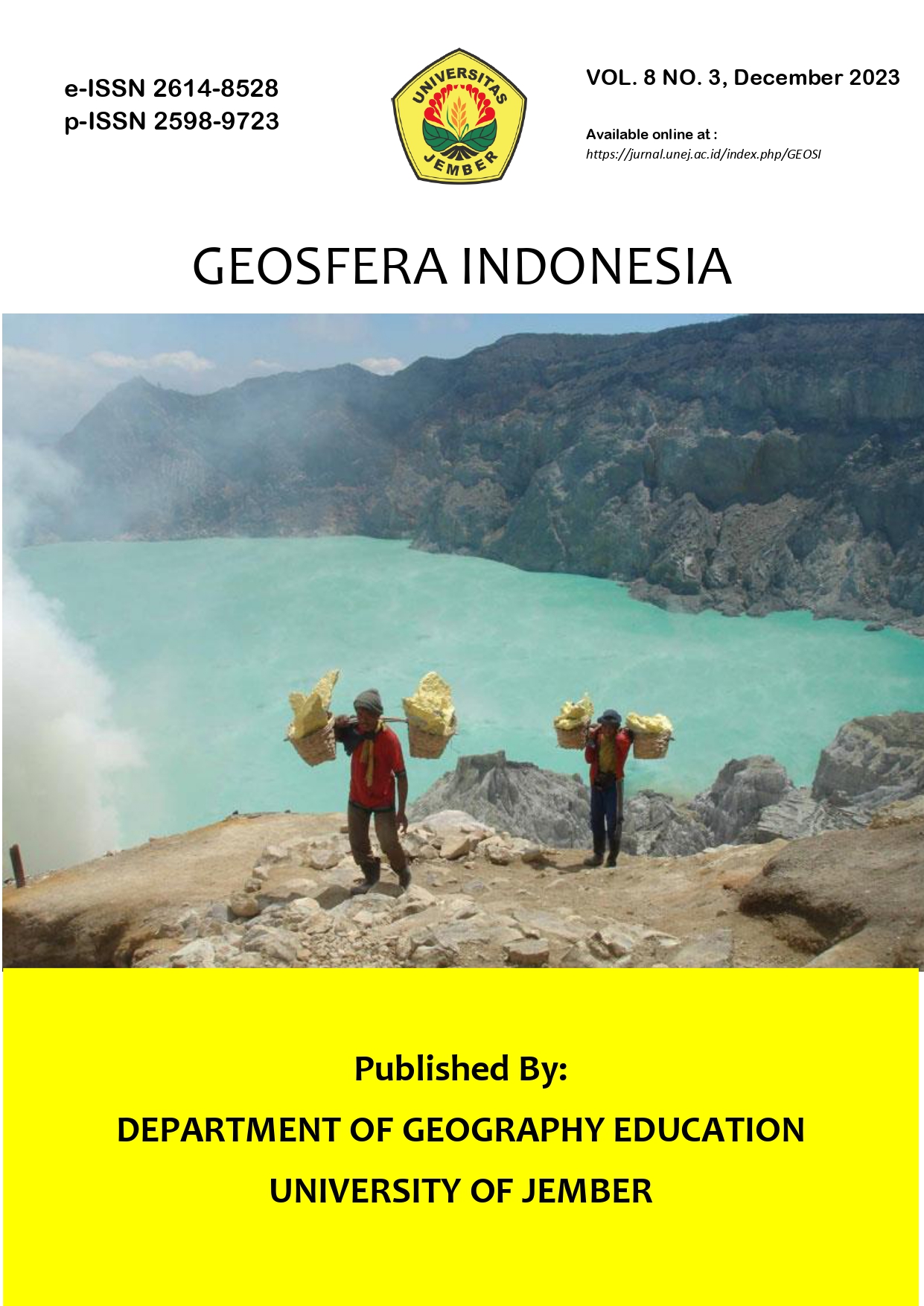Study of Waste Generations and Potential Implementation of Community-Based Waste Management in Residential Area
DOI:
https://doi.org/10.19184/geosi.v8i3.38690Keywords:
Waste Household, Residential Communities, Operational Cost of 3R, Waste Treatment FacilitiesAbstract
Bogor is one of the cities in Indonesia with a dense population and is experiencing population growth every year. Like other city problems, waste is also a problem in Bogor City. Waste generation in cities like Bogor City has been continued to increase since 2005. Even though the Bogor City Government has socialized with changes in waste management with a new paradigm, those living in residential areas are still using the old paradigm principle which is collect-transport-throw (end of a pipe). Therefore, a study was conducted to determine the waste generated and the perception and role of community participation in managing waste, especially household waste in residential areas. In this study, data collection was carried out in one of the housing areas in Bogor City, namely the Pakuan Regency. The collection of daily waste data to measure waste generation and composition is carried out based on the Indonesian National Standard 19-3964-1994 method. This data analysis technique uses a qualitative descriptive analysis with respondents differentiated on the basis of type of house and the number of occupants. This research produces data on waste generation for small, medium, and large house types 286,12 kg/houses/year, 366,57 tons/houses/year, and 523,67 kg/houses//year respectively. The result showed that the total of household waste, the level of participation and the household’s willingness to pay for TPS 3R plan made it possible to implement the TPS 3R program in this residential. Operational cost for TPS 3R can be covered from the retribution annual revenue.
Downloads
References
Aprilia, A. (2021). Waste Management in Indonesia and Jakarta: Challenges and Way Forward. 23rd ASEF Summer University, October, 1–18.
Atmanti, H. D., & Kadang, J. (2022). Waste management during a pandemic (Case Study : Student of Economics and Business Faculty Diponegoro University and Tadulako University). International Journal of Economics, Business and Accounting Research, 6(2), 930–936.
Brigita, G., & Rahardyan, B. (2013). Analisa pengelolaan sampah makanan Di Kota Bandung. Jurnal Tehnik Lingkungan, 19(1), 34–45. https://doi.org/10.5614/jtl.2013.19.1.4.
Brotosusilo, A., Utari, D., Negoro, H. A., Firdaus, A., & Velentina, R. A. (2022). Community empowerment of waste management in the urban environment:More attention on waste issues through formal and informal educations. Global Journal of Environmental Science and Management, 8(2), 209–224. https://doi.org/10.22034/GJESM.2022.02.05.
Nwachukwu, D. O., Nwelue, K. N. K., Ibekwe, C. C., Anyanwu, U. G., Obilor, F., Ekwe-Emeagha, E., ... & Ohajianya, D. O. (2018). Effects of Household Waste Generation, Disposal and Management on Farmers’ Health in Owerri Metropolis of IMO State, Nigeria. International Journal of Environment, Agriculture and Biotechnology, 3(5), 266200. https://doi.org/10.22161/ijeab/3.5.37.
Da Costa, C., & Bowo Suharto, R. (2018). Environmental waste management system in effort creates sustainable semarang. Jurnal Daulat Hukum, 1(3), 849. https://doi.org/10.30659/jdh.v1i3.3413.
Demirarslan, K. O., & çelik, B. Y. (2018). Urban solid waste characterization in the east part of Black Sea region. Global Journal of Environmental Science and Management, 4(2), 167–182. https://doi.org/10.22034/gjesm.2018.04.02.005.
Elamin, M. Z., Ilmi, K. N., Tahrirah, T., Zarnuzi, Y. A., Suci, Y. C., Rahmawati, D. R., Dwi P., D. M., Kusumaardhani, R., Rohmawati, R. A., Bhagaskara, P. A., & Nafisa, I. F. (2018). Analisis pengelolaan sampah pada masyarakat Desa Disanah Kecamatan Sreseh Kabupaten Sampang. Jurnal Kesehatan Lingkungan, 10(4), 368. https://doi.org/10.20473/jkl.v10i4.2018.368-375.
Fadhullah, W., Imran, N. I. N., Ismail, S. N. S., Jaafar, M. H., & Abdullah, H. (2022). Household solid waste management practices and perceptions among residents in the East Coast of Malaysia. BMC Public Health, 22(1), 1–20. https://doi.org/10.1186/s12889-021-12274-7.
Fauzi, A. (2014). Valuasi Ekonomi dan Penilaian Kerusakan Sumber Daya Alam dan Lingkungan. IPB Press.
Ghazali, A., Tjakraatmadja, J. H., Sunarti, S., & Pratiwi, E. Y. D. (2021). Resident-based Learning Model for sustainable resident participation in municipal solid waste management program. Global Journal of Environmental Science and Management, 7(4), 599–624. https://doi.org/10.22034/gjesm.2021.04.08.
Haswindy, S., & Yuliana, F. (2018). Partisipasi masyarakat dalam pengelolaan sampah pemukiman pada Kecamatan Tungkil Ilir Kabupaten Tanjung Jabung Barat. Jurnal Ilmu Lingkungan, 15(2), 96. https://doi.org/10.14710/jil.15.2.96-111.
Isnaeni, I., & Dewi, D. I. K. (2018). What are the changes in the use of space in the residential neighborhood of residence as a place of business? Jurnal Teknik Sipil Dan Perencanaan, 20(1), 30–40. https://doi.org/10.15294/jtsp.v20i1.12390.
Jereme, I. A., Ara Begum, R., Abdul Talib, B., Siwar Emeritus Professor, C., & MahmudulAlam, M. (2015). Assessing problems and prospects of solid waste management. E-Bangi, 10(2), 70–87.
Limon, M. R., Vallente, J. P. C., & Corales, N. C. T. (2020). Solid waste management beliefs and practices in rural households towards sustainable development and pro-environmental citizenship. Global Journal of Environmental Science and Management, 6(4), 441–456. https://doi.org/10.22034/gjesm.2020.04.02.
Liu, X., Wang, Z., Li, W., Li, G., & Zhang, Y. (2019). Mechanisms of public education influencing waste classification willingness of urban residents. Resources, Conservation and Recycling, 149381–390. https://doi.org/10.1016/j.resconrec.2019.06.001.
Lozano Lazo, D. P., Bojanic Helbingen, C., & Gasparatos, A. (2023). Household waste generation, composition and determining factors in rapidly urbanizing developing cities: case study of Santa Cruz de la Sierra, Bolivia. Journal of Material Cycles and Waste Management, 25(1), 565–581. https://doi.org/10.1007/s10163-022-01535-1.
Maalouf, A., & Mavropoulos, A. (2023). Re-assessing global municipal solid waste generation. Waste Management & Research, 41(4), 936-947. https://doi.org/10.1177/0734242X221074116.
Manupada, N. P. M., Ismail, A., & Ekayani, M. (2019). Willingness to pay warung makan terhadap Tps 3R Di Desa Babakan Kabupaten Bogor. ECOTROPHIC : Jurnal Ilmu Lingkungan (Journal of Environmental Science), 13(2), 147. https://doi.org/10.24843/ejes.2019.v13.i02.p03.
Ministry of Public Works, Republik Indonesia. (2013). Permen PU Nomor 3/PRT/M/ 2013 tentang Penyelenggaraan Prasarana dan Sarana Persampahan dalam Penanganan Sampah Rumah Tangga dan Sampah Sejenis Sampah Rumah Tangga. Permen PU Nomor 3/PRT/M/ 2013, Nomor 65(879), 2004–2006.
Mulasari, S. A. (2013). Hubungan tingkat pengetahuan dan sikap terhadap perilaku masyarakat dalam mengolah sampah di Dusun Padukuhan Desa Sidokarto Kecamatan Godean Kabupaten Sleman Yogyakarta. Jurnal Kesehatan Masyarakat (Journal of Public Health), 6(3). https://doi.org/10.12928/kesmas.v6i3.1055.
Nurpagi, E. M., Ekayani, M., & Ismail, A. (2022). Waste generation potential and household’s willingness to pay for the management of Community 3R Waste Treatment Facility (TPS 3R) in Babakan Village, Bogor Regency. Journal of Natural Resources & Environment Management)/Jurnal Pengelolaan Sumberdaya Alam dan Lingkungan, 12(4).
Pratama, A. D., Bagus Priyambada, I., & Siwi Handayani, D. (2017). Perencanaan sistem pengelolaan sampah terpadu studi kasus Rw 3, 4, Dan 5 Kelurahan Bandarharjo Kecamatan Semarang Utara Kota Semarang. Jurnal Teknik Lingkungan, 6(1), 1–9.
Pratama, R. A., & Ihsan, I. M. (2017). The Opportunities to Strengthen the Role of Bank Sampah to Reduce Municipal Waste Case Study: Bank Sampah Malang. Teknologi Lingkungan, 18(3), 112–119.
Prema, E. (2021). Solid Waste Management in the Construction Sector: A Prerequisite for Achieving Sustainable Development Goals. IOP Conference Series: Earth and Environmental Science, 850(1). https://doi.org/10.1088/1755-1315/850/1/012007
PUPR. (2021). Kepmen PUPR No 177/KTPS/M/2021 Tentang Penetapan Lokasi dan Besaran Bantuan Kegiatan Infrastruktur Berbasis Masyarakat Tahun Anggaran 2021. Menteri Pekerjaan Umum Dan Perumahan Rakyat Republik Indonesia, 95–140.
Raghu, S. J., & Rodrigues, L. L. R. (2020). Behavioral aspects of solid waste management: A systematic review. Journal of the Air and Waste Management Association, 70(12), 1268–1302. https://doi.org/10.1080/10962247.2020.1823524.
Ramdahan, M., & Hermawan, E. (2022). Permasalahan sampah di Kota Bogor sebagai wilayah penyangga DKI Jakarta. Jurnal Riset Jakarta, 15(2), 77. https://doi.org/https://doi.org/10.37439/jurnaldrd.v15i2.59.
Ratya, H., & Herumurti, W. (2017). Timbulan dan komposisi sampah rumah tangga di Kecamatan Rungkut Surabaya. Jurnal Teknik ITS, 6(2). https://doi.org/10.12962/j23373539.v6i2.24675.
Riruma, N., Sinaga, N., & Lekitoo, M. N. (2021). Kajian pengelolaan sampah rumah tangga (SRT) dan sampah sejenis sampah rumah tangga (SSRT) di Kabupaten Teluk Bintuni. Cassowary, 4(1), 39–51. https://doi.org/10.30862/casssowary.cs.v5.i1.67.
Ruslinda, Y., Indah, S., & Laylani, W. (2012). Study of solid waste generation, composition and characteristic of domestic solid waste in Bukittinggi City. Jurnal Teknik Lingkungan UNAND, 9(1), 1–12.
Sa’diyah, A. F., Purnomo, E. P., & Kasiwi, A. N. (2020). Waste management in the implementation of smart city in Bogor City. Jurnal Ilmu Pemerintahan Widya Praja, 46(1), 271–279. https://doi.org/10.33701/jipwp.v46i1.773.
Safira, R. H., Sari, M. M., Notodarmojo, S., Inoue, T., & Harryes, R. K. (2021). Potential Utilization Analysis of River Waste in Jakarta, Indonesia. Geosfera Indonesia, 6(2), 157. https://doi.org/10.19184/geosi.v6i2.23297.
Saleh, A. A. (2018). Solid waste management in Shah Alam city residential area. Journal of Sustainability Science and Management, 13(1), 211-227. 13(1), 211–227.
Setyoadi, N. H. (2018). Faktor pendorong keberlanjutan pengelolaan sampah rumah tangga berbasis masyarakat di Kota Balikpapan dan Bogor. Jurnal Sains &Teknologi Lingkungan, 10(1), 51–66. https://doi.org/10.20885/jstl.vol10.iss1.art5.
Shen, J., Zheng, D., Zhang, X., & Qu, M. (2020). Investigating rural domestic waste sorting intentions based on an integrative framework of planned behavior theory and normative activation models: Evidence from guanzhong basin, China. International Journal of Environmental Research and Public Health, 17(13), 1–14. https://doi.org/10.3390/ijerph17134887.
SIPSN,(2021). Data Pengelolaan Sampah : Komposisi Sampah. https://sipsn.menlhk.go.id/sipsn/public/data/komposisi
Suciutami, M. E., Arifin, A., Irsan, R., Purnaini, R., & Fitrianingsih, Y. (2022). Evaluasi Aspek Teknis Operasional Pengelolaan Persampahan di Kecamatan Putussibau Utara Kabupaten Kapuas Hulu. Jurnal Ilmu Lingkungan, 20(3), 588–596. https://doi.org/10.14710/jil.20.3.588-596.
Suharsaputra, U. (2012). Metode Penelitian kuantitatif, kualitatif dan tindakan. Refika Aditama.
Wulandari, I. S., Koderi, K., & Soemarno, S. (2021). Household waste management towards a New Normal Era (Study at Suzuki Residents, Watutumou III Village, Kalawat District). Indonesian Journal of Environmental Management and Sustainability, 5(1), 35-44.
Yasin, A. S. (2021). Assessing households’ willingness to pay for improved solid waste management services in Jigjiga, Ethiopia. Environment and Ecology Research, 9(2), 39–44. https://doi.org/10.13189/eer.2021.090201.




